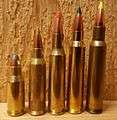7.62×40mm Wilson Tactical
The 7.62×40mm Wilson Tactical (7.62×40mm WT) is a centerfire rifle cartridge introduced in 2011 by Wilson Combat. The goal was to produce an accurate, low-recoil .30-caliber hunting cartridge that could be used in an AR-15-type rifle using as many standard components as possible.
| 7.62×40mm Wilson Tactical[1] | ||||||||||||||||||||
|---|---|---|---|---|---|---|---|---|---|---|---|---|---|---|---|---|---|---|---|---|
 | ||||||||||||||||||||
| Type | Rifle | |||||||||||||||||||
| Place of origin | United States of America | |||||||||||||||||||
| Production history | ||||||||||||||||||||
| Designer | Kurt Buckert[1] | |||||||||||||||||||
| Designed | 2011[1] | |||||||||||||||||||
| Manufacturer | Wilson Combat[1] | |||||||||||||||||||
| Produced | 2011-present[1] | |||||||||||||||||||
| Specifications | ||||||||||||||||||||
| Parent case | 5.56×45mm NATO[1] | |||||||||||||||||||
| Case type | Rimless, bottleneck[1] | |||||||||||||||||||
| Bullet diameter | .308 in (7.8 mm) | |||||||||||||||||||
| Base diameter | .377[1] | |||||||||||||||||||
| Rim diameter | .378[1] | |||||||||||||||||||
| Rim thickness | .045[1] | |||||||||||||||||||
| Case length | 1.565[1] | |||||||||||||||||||
| Overall length | 2.250[1] | |||||||||||||||||||
| Rifling twist | 1-12"[1] | |||||||||||||||||||
| Primer type | Small rifle[1] | |||||||||||||||||||
| Ballistic performance | ||||||||||||||||||||
| ||||||||||||||||||||
| Test barrel length: 20" for the 110gr Sierra HP, 16" for all others Source(s): http://shopwilsoncombat.com/Wilson-Combat-Custom-Ammunition/products/414/ | ||||||||||||||||||||
Design
The 7.62×40mm WT (Wilson Tactical)[2] is based on the 7.62×40mm wildcat cartridge, the shoulder of the WT was moved .003" forward and the throat was made .001" larger to accommodate mass-production tolerances while staying within the tolerance of the original reloading die tooling of the 7.62×40mm.[1] The parent case (5.56×45mm NATO) was trimmed down to 1.560" and re-sized with a 7.62×40mm WT sizing die.[3] The overall case length after the shortening and re-sizing is 1.565". The cartridge was designed to use .308" diameter bullets in weights of 110 to 150 grains, with a standard twist rate of 1-12".[1] Wilson Combat states that heavier bullets can be used in a barrel with a 1-8" twist rate for subsonic loads.[4]
Cartridge use
Wilson had been hunting feral hogs with both the .30 Remington AR and .300 AAC Blackout. However, since most feral hog hunting is performed at night, he did not like looking for proprietary brass cases after he had fired them and designed the 7.62 X 40mm around the inexpensive and readily available 5.56 NATO cartridge.[1][3] (The 7.62x40mm WT is a cartridge designed by Kurt Buchert and brought to market by Wilson Combat. )
The 7.62×40mm WT is designed for both tactical and defense rifles and for hunting medium-sized game.[4][5] In tactical applications, the 110 gr Barnes TTSX bullet can be used to penetrate tough barriers, while the soft-point and hollow-point bullets provide reliable terminal performance on soft tissue.[6] In hunting applications, the 7.62×40mm WT delivers slightly more energy than the 7.62×39mm and is similar to the 6.8 SPC[7] and .30-30 Winchester, making it useful for game such as deer and feral hogs, particularly for hunters who want to use an AR-15, but cannot legally use the 5.56 round, due to its low power factor on game.[8]
Firearms writer Wayne Van Zwoll describes the round as being very accurate.[9]
Firearms chambered for 7.62×40mm WT
Since the 7.62×40mm WT is based upon the 5.56mm NATO, the only required modification to AR-15/M4 rifles currently chambered for 5.56mm NATO or .223 Remington is a new barrel. Wilson Combat offers barrels and complete upper receiver sets, with barrel lengths offered in 11.3",[10] 16",[11] 18",[12] and 20".[11] US Machine Gun Armory in Utah has begun offering a conversion kit for the Mk 46/M249 in 7.62 WT.[13]
Because of Wilson's modification to the parent case, some capacity is lost in a standard AR-15 magazine. Wilson partnered with Lancer to produce a true 20-round magazine for the 7.62 X40 by removing the feed guide rib inside the magazine and sells the magazine as a "Lancer 1.5".[14]
Cartridge availability
Wilson Combat currently (2011) offers custom loaded 7.62×40mm WT ammunition with bullet weights of 110gr and 125gr, but the cartridge can also be hand-loaded using new brass available from Wilson Combat, or by using 5.56mm NATO or .223 Remington brass and the appropriate sizing/forming dies available from Wilson Combat.[14]
See also
- List of rifle cartridges
- Glossary of firearms terminology
- .300 AAC Blackout
References
- Woodard, W. Todd (24 October 2016). Cartridges of the World: A Complete and Illustrated Reference for Over 1500 Cartridges. Iola, Wisconsin: F+W Media, Inc. pp. 120–121. ISBN 978-1-4402-4642-5.
- Loeb, Bill (2 January 2015). The Custom 1911. Iola, Wisconsin: F+W Media, Inc. p. 106. ISBN 978-1-4402-4055-3.
- Mann, Richard A. (30 April 2014). GunDigest Shooter's Guide to the AR-15. Iola, Wisconsin: Krause Publications. pp. 62–63. ISBN 978-1-4402-3847-5.
- Snow, John B. (4 April 2011). "Wilson Tactical 7.62x40: Another New AR Cartridge". Outdoor Life.
- Mann, Richard (1 November 2011). "7.62×40 WT".
- "Wilson Combat's New 7.62×40 WT Cartridge for AR Platform". Accurate Shooter. 2011.
- Staff (2011). "Wilson Combat Introduces 7.62x40 WT Cartridge". American Rifleman.
- Sweeney, Patrick (2012). Gun Digest Book of the AR-15. 4. Iola, Wisconsin: F+W Media. pp. 30–31. ISBN 978-1-4402-2876-6.
- Van Zwoll, Wayne (2015). Shooter's Bible Guide to Handloading: A Comprehensive Reference for Responsible and Reliable Reloading. Skyhorse Publishing Company, Incorporated. pp. 236–237. ISBN 978-1-63450-971-8.
- Garrett, Rob (2 February 2013). "WILSON COMBAT SBR TACTICAL 7.62×40 WT". Tactical Life.
- Sweeney, Patrick (18 May 2012). "Review: Wilson Combat 7.62×40".
- "Wilson Combat's 7.62x40WT (Wilson Tactical) Review". RifleShooter.com. 11 August 2012.
- Johnson, Steve (2011). "M249 SAW in 7.62x40mm WT / .300 AAC BLK / 7.62x39mm and 7.62x51mm Conversion Kit". TheFirearmBlog.
- Sweeney, Patrick (12 August 2013). "Cute Little .300's". In Jerry Lee (ed.). Gun Digest 2014 (68th ed.). Iola, Wisconsin: Krause Publications. pp. 118–120. ISBN 978-1-4402-3542-9.
